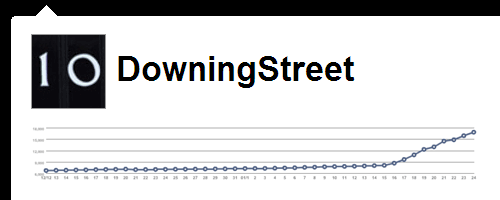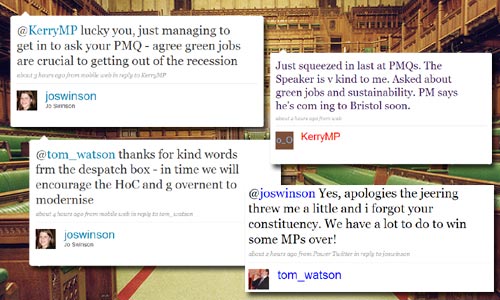
One of the biggest successes in e-government this past year, and arguably one of the most surprising, is Downing Street’s use of Twitter. And thanks to a remarkable couple of weeks, the Prime Minister’s Office now finds itself in the Top 100 of the most followed Twitter accounts worldwide, as ranked (fairly reliably) by Twitterholic.com.
It’s been a model of social media usage. The account was first publicised (here, by me) almost exactly ten months ago: the initial tweets were, as with a lot of corporates, automated via the Twitterfeed service. But within a week, they were beginning to talk like ‘proper’ users; nowadays, of course, it’s perfectly normal for them to reply to comments and queries from other users – who seem genuinely stunned that someone at No1o is listening. It’s often been quoted as an example of best practice – and this week, I’ve seen several people (eg the influential Mashable blog) suggesting the Obama White House should use it as its model.
Growth in the number of followers has been steady rather than spectacular – until earlier this month, when things went into overdrive. Just ten days ago, they had just over 8,000 followers; the Twitterholic number quoted for today is more than double that… putting them at #96 in the world. But as I write this, the @downingstreet Twitter page reports a follower count in excess of 19,000 – enough to put them even higher in the rankings tomorrow, leaping ahead of internet ‘big names’ like Loic Le Meur, Dave Winer and Zefrank. (And even, dare i even say it, @wordpress!) Any higher, and you’re into serious celebrity territory.
When you see a chart looking like that, you’re inevitably trying to think what could possibly be causing it. I’m not aware of any rational explanation myself… and a quick scan of recent followers doesn’t suggest an influx of spam accounts. (Well, no more than usual.)
I can only offer a couple of suggestions:
- The Obama effect. There’s been a lot of speculation about what Team O might do with whitehouse.gov – and maybe that’s stimulated interest in what’s happening elsewhere. (I have to say though, the Canadian and Australian PMs haven’t seen anything like the same growth.)
- In the wake of Stephen Fry, Jonathan Ross and John Cleese – Brits are waking up to Twitter. Hitwise published data last week claiming Twitter’s UK-based website traffic (never mind other usage methods) was up 10-fold in a year, with – by the look of it – a further acceleration in the last few weeks. I guess the PM’s Office has made it into that category of Famous UK People You Should Follow When You Join: certainly if you look at the most recent followers, a lot of them are new Twitter users, and @downingstreet is among their first handful of follows.
It’s truly an amazing success story: and the secret is simple – it’s playing by the (evolving) rules of the medium. The No10 web team post a range of stuff: what they described earlier this week as ‘information mixed with colour‘ – same as every good Twitterer does. Sometimes it’s important government stuff; sometimes it’s the ‘what I had for breakfast’ of Twitter stereotyping. They ask for feedback; they respond to questions, where they can. There’s no lengthy clearance process; they trust the guys to be sensible, and it’s a policy that has worked. The fact that it’s all kept anonymous, and the fact that it isn’t actually the PM himself (and they make no secret of that), have not hindered things.
Now, with all those people listening, what would you do with them?

 French left-of-centre newspaper
French left-of-centre newspaper  At 11:30 this morning,
At 11:30 this morning, 
